If you have received poor medical and are in need of expert advice, call Jason Brady, specialist medical negligence solicitor.
CALL 0800 083 5500
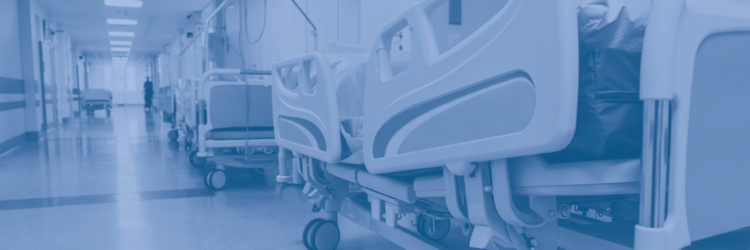
New research from Blackwater Law medical negligence solicitors shows over 40,000 Serious Incidents have been recorded by NHS trusts and health boards across England and Wales in the two financial years between 1st April 2015 – 31st March 2017.
Serious Incidents are adverse events occurring during the course of healthcare being provided or within the healthcare system that have a profound impact on patients, carers, NHS staff or NHS organisations. The severity of Serious Incidents when they do occur is such that they justify a heightened response and investigation by the NHS trust or health board involved.
Serious Incidents include events where:
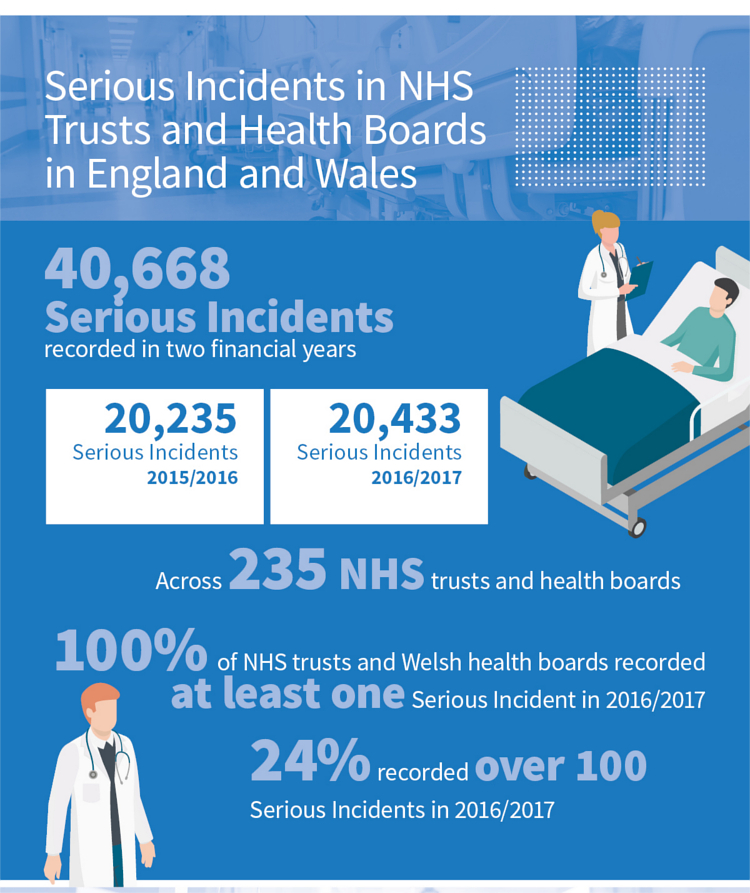
Responses to Freedom of Information requests made by Blackwater Law show 235 NHS trusts and Welsh health boards recorded a total of 40,668 between 1st April 2015 – 31st March 2017. This is believed to be the first time this information has been made public.
Jason Brady, Partner and medical negligence solicitor at Blackwater Law, commented:
“It is truly concerning to learn that the number of Serious Incidents being recorded by NHS trusts across England and Wales stands at such a significant figure. It is crucial to remember that these are not just statistics. Each of these incidents is a patient and a family that may be suffering, potentially unnecessarily, with possible long-term implications for their future and quality of life.”
The research report identifies the NHS trusts and Welsh health boards from which data was collated as being one of three types of healthcare provider – acute and community health, mental health or ambulance Trust – based on the primary services provided by these trusts and health boards and information available from NHS Choice[1] and NHS Improvement[2]. This identified:
By grouping NHS trusts and health boards in this way, researchers at Blackwater Law were able to better understand the frequency and type of Serious Incidents being recorded by these different types of NHS organisation.
Across the 171 acute and community health trusts and Welsh health boards a total of 27,789 Serious Incidents had been recorded between 1st April 2015 – 31st March 2017.
As to be expected, given the varying number of sites that each trust or health board operates and the differing levels and types of services offered by each individual trust, the number of Serious Incidents recorded varies significantly. The highest number of Serious Incidents recorded by an individual trust for the period 1st April 2016 – 31st March 2017 was 778, recorded by The Pennine Acute Hospitals NHS Trust3. However, over 24% of the 171 acute and community health trusts and boards recorded over 100 Serious Incidents in the same period.
The five trusts and health boards recording the highest numbers of Serious Incidents during the period were:
In contrast, those trusts and health boards recording the lowest numbers of Serious Incidents were:
In addition to ascertaining the number of Serious Incidents recorded by the trusts and health boards, Blackwater Law also obtained a breakdown of the types of Serious Incidents recorded by 96 (56%) of the 171 acute and community health trusts during the period 1st April 2016 – 31st March 2017. This revealed 679 different categories and descriptions relating to 7,867 of the recorded Serious Incidents for these trust and health boards.
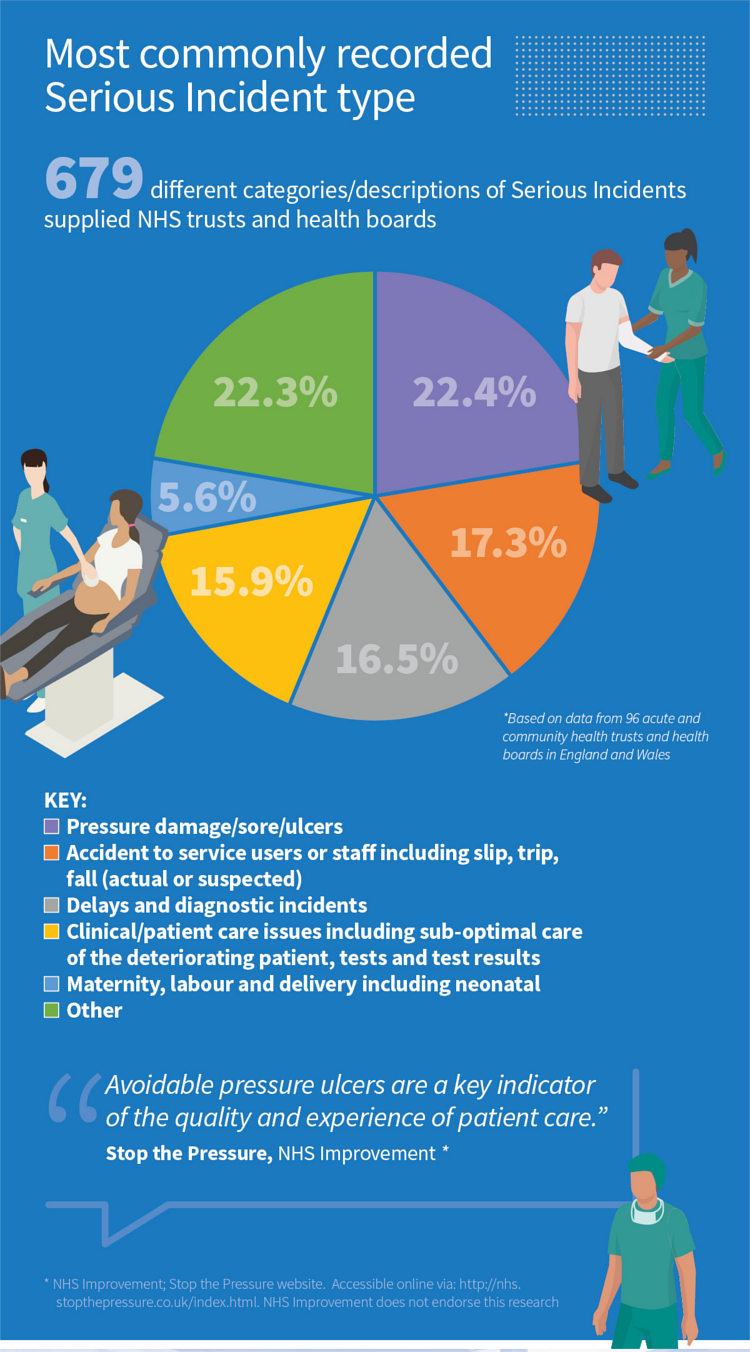
The most commonly occurring Serious Incidents were the occurrence of pressure ulcers and damage, estimated to account for 22.4% of all Serious Incidents recorded by acute and community trusts and health boards. Accident s to service users and staff including slips, trips and falls (actual or suspected) accounted for 17.3%; delays and diagnostic incidents for 16.5% and clinical and patient care issues including sub-optimal care of the deteriorating patient, tests and test results for 15.9%.Of particular concern to Blackwater Law was that an estimated 5.6% of Serious Incidents recorded by these trusts related to Maternity, labour and delivery including neonatal.
Commenting on this, Jason Brady of Blackwater Law a specialist in representing families in serious birth injury claims, said:
“It is particularly concerning to see that more than 5% of the Serious Incidents for which Blackwater Law was provided a category/ description related to maternity, labour and delivery including neonatal. Injuries to babies can be catastrophic and significantly life-limiting. Whilst not all of these particular Serious Incidents will involve medical negligence, given the potential implications for the future of that child and the family, the fact some of these incidents may have been avoidable is distressing to say the least.”
Backwater Law received responses from the 53 mental health trusts in England which showed these trusts had recoded 11, 872 Serious Incidents in the period between 1st April 2015 and 31st March 2017. In the most recent full financial year of 2016/2017, nearly half (47%) of the mental health trusts recorded over 100 incidents.
In relation to Serious Incidents recorded at 29 (55%) of the NHS mental health trusts, Blackwater Law received descriptions or categorisations of the adverse events that had been recorded. This provided Blackwater Law with excellent insight into the nature of the Serious Incidents that were being recorded and revealed 175 different categorisations of Serious Incidents being used by NHS mental health trusts.
In the absence of any standardisation and so as to be able to understand the types of Serious Incident being recorded most frequently, Blackwater Law grouped similar Serious Incidents into categories.
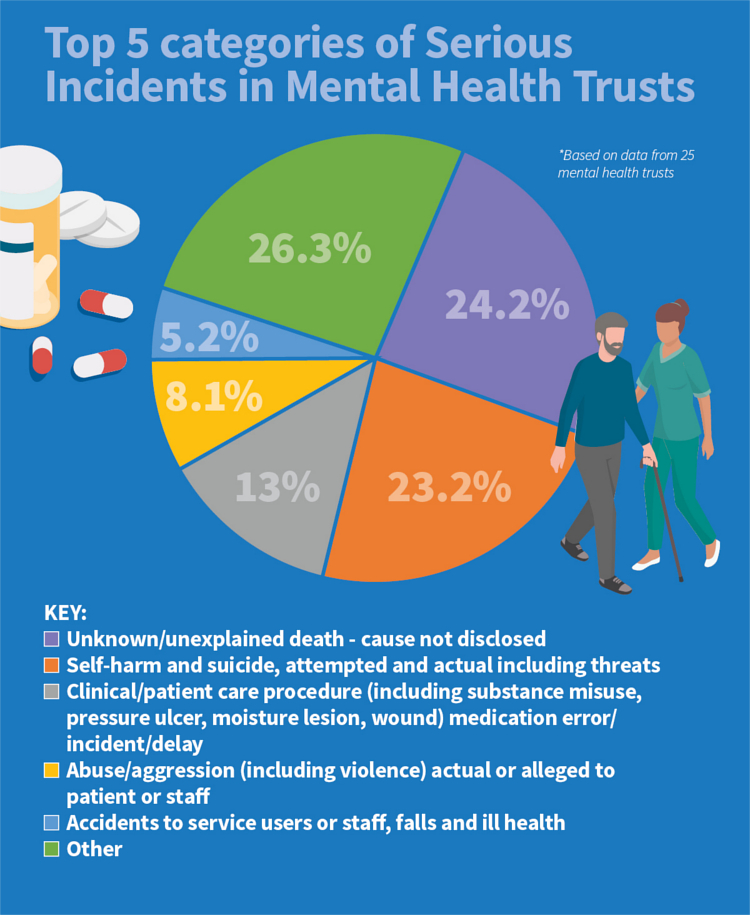
Of the findings in relation to mental health trusts, Jason Brady said:
“The data relating to mental health trusts is particularly concerning. To learn that approximately 24% of Serious Incidents recorded by these Trusts related to unexplained death and approximately a further 23% to suicide and self-harm, including attempted and alleged, concerns not only us, but we expect also the public. Blackwater Law has seen a noticeable increase in enquiries from individuals and families relating to alleged failings in mental health services in the recent past; this data provides a background as to why that may be.”
Blackwater Law received responses from all 11 ambulance trusts across England and Wales and this showed these trusts had recorded a total of 1,007 Serious Incidents in the two year period from 1st April 2015 – 31st March 2017. Year on year, the figure increased 9.4% from 481 in the financial year 2015/2016 to 526 in 2016/2017. The increase in need for and use of ambulance services has been well documented, particularly over the recent winter months. With this in mind, increases in Serious Incidents recorded by these trusts should be considered in light of increasing patient contacts.
Whilst the research shows an increase in Serious Incidents being recorded, this data alone cannot suggest deteriorating care levels at being provided by a particular NHS Trust.
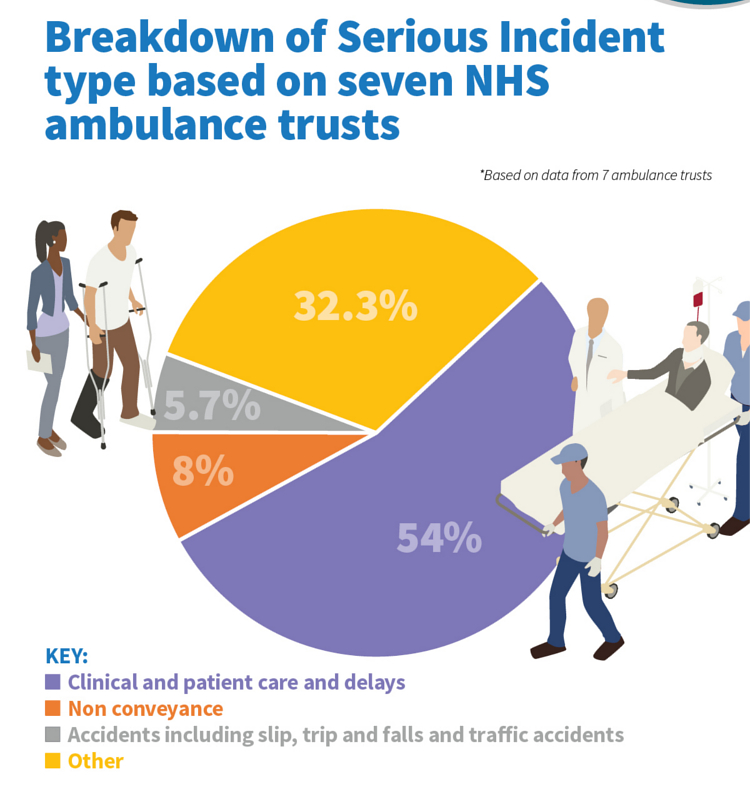
Blackwater Law received enhanced information on recorded Serious Incidents from 7 of the 11 ambulance trusts. This provided Blackwater Law with greater insight into the nature of 386 (73%) of Serious Incidents recorded by all ambulance these trusts during the period 1st April 2016-31st March 2017.
Blackwater Law is a specialist team of medical negligence solicitors which represents individuals and families across the country in medical negligence litigation claims where they have received poor care and have suffered as a result. The team at Blackwater Law are seeing an increasing number of people approach them who have suffered poor care where a Serious Incident had been recorded by the Trust or Health Board. Blackwater Law wanted to understand the true frequency with which such adverse events were taking place across the NHS in England and Wales and this data was not publicly available before this research was conducted.
A Freedom of Information (FOI) (2000) request was sent to all 242 NHS trusts and Welsh health boards in England and Wales that existed during the period considered. The request asked for the number of Serious Incidents recorded by the individual NHS trust for both of the financial years 2015/2016 and 2016/2017 as well as a breakdown of incident type, where this could be provided.
Five trusts provided data but explicitly refused permission for their organisations Serious Incident data to be used within this report and therefore have been omitted from the report in its entirety (Kettering General Hospital NHS Foundation Trust, University Hospital Birmingham NHS Foundation Trust, The Dudley Group NHS Foundation Trust, United Lincolnshire NHS Trust and West Hertfordshire NHS Trust). In addition, the report features no data relating to the two NHS trusts which did not respond to the original FOI request sent to them, or subsequent re-approaches (London North West University Healthcare NHS Trust and Norfolk & Norwich University Hospitals NHS Foundation Trust). As a result, this report features the data for Serious Incidents recorded by 228 NHS trusts in England and Wales and seven Welsh health boards.
Of the 235 NHS trusts and Welsh health boards in England and Wales whose data is included in the report, 132 provided a breakdown of the type of Serious Incidents. These amounted to 960 different categorisations and descriptions which were grouped into similar, commonly occurring Serious Incidents.
Data has been provided by NHS trusts and Welsh health boards directly via email or via the Trust or Welsh Health Board providing direction to an official Trust or Health Board document, in response to an FOI request. Where provided by direction to a document, endnotes referenced against the Trust or Health Board identify this document.
Every effort has been taken to ensure the data is accurate; however Blackwater Law has relied on the accuracy of the data as provided by individual NHS trusts and health boards.
This article, any featured infographics and the accompanying report contain public sector information licensed to Blackwater Law under the Open Government Licence v3.0.[viii] , the Open Government Licence v2.0.[ix] and the Re-use of Public Sector Information Regulations (2015)[x].
[i] NHS England Patient Safety Domain (27 March, 2015); Serious Incident Framework: Supporting learning to prevent reoccurrence, pages 7. Accessible online via: https://improvement.nhs.uk/uploads/documents/serious-incidnt-framwrk.pdf (accessed on 29th January 2018).
[ii] NHS Choices; Authorities and Trusts, NHS Trusts. Accessible online via: https://www.nhs.uk/ServiceDirectories/Pages/NHSTrustListing.aspx (accessed on 8th May 2017) and NHS Wales; Structure. Accessible via: http://www.wales.nhs.uk/nhswalesaboutus/structure (accessed on 8th May 2017). 72 NHS lists of different types of trust; as identified in Organisation
[iii] Patient Safety Incident Reports (27th September 2017). Accessible online via: https://improvement.nhs.uk/resources/organisation-patient-safety-incident-reports-27september-2017/ (accessed on 29th January 2018)
[iv] Noted at request of Trust: The trust recorded 643 “A&E Extended Wait For Assess (More Than 12 Hrs)” as Serious Incidents in 2016/17 which were no harm events, but the CCG requested we logged them as Serious Incidents.
[v] Barts Health NHS Trust (2017); Quality Accounts 2016-17, page 12.
[vi] The Christie NHS Foundation Trust; Annual Report and Accounts 2016/17, page 83. Accessible online via: http://www.christie.nhs.uk/about-us/the-foundation-trust/annual-reports/ (accessed on 12th June 2016)
[vii] Liverpool Heart and Chest Hospital NHS Foundation Trust; Annual Report and Accounts 2016/17, page 76. Accessible online via: https://www.lhch.nhs.uk/media/5409/lhch-annual-report-2016-17-final.pdf (accessed on 1th June 2017).
[viii]Open Government Licence v3.0. for public sector information (delivered by The National Archives). Accessible online via: http://www.nationalarchives.gov.uk/doc/open-government-licence/version/3/
[ix] Open Government Licence v2.0. for public sector information (delivered by The National Archives), accessible online via: http://www.nationalarchives.gov.uk/doc/open-government-licence/version/2/
[x] Legislation.gov.uk (delivered by The National Archives) Re-use of Public Sector Information Regulations 2015. Accessible online via: http://www.legislation.gov.uk/uksi/2015/1415/contents/made